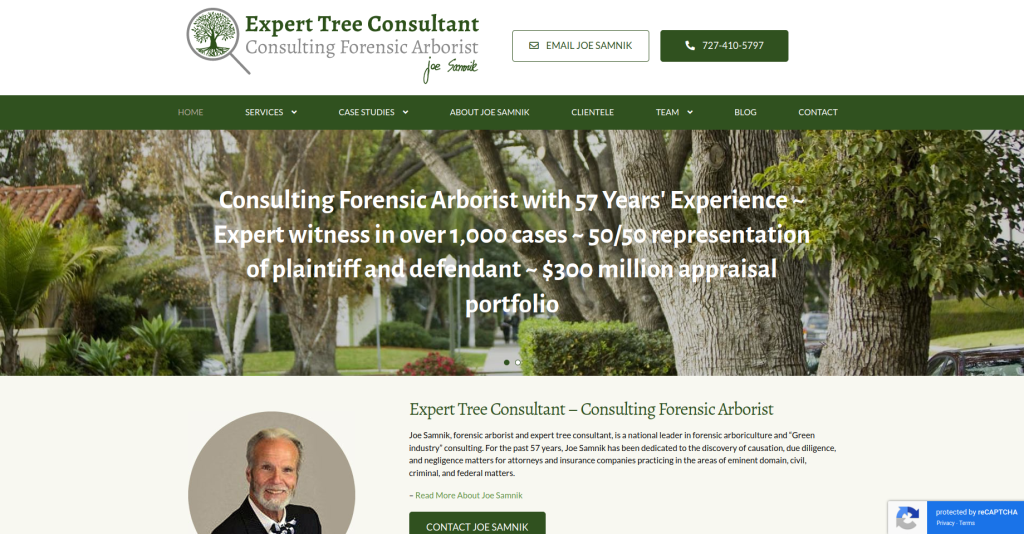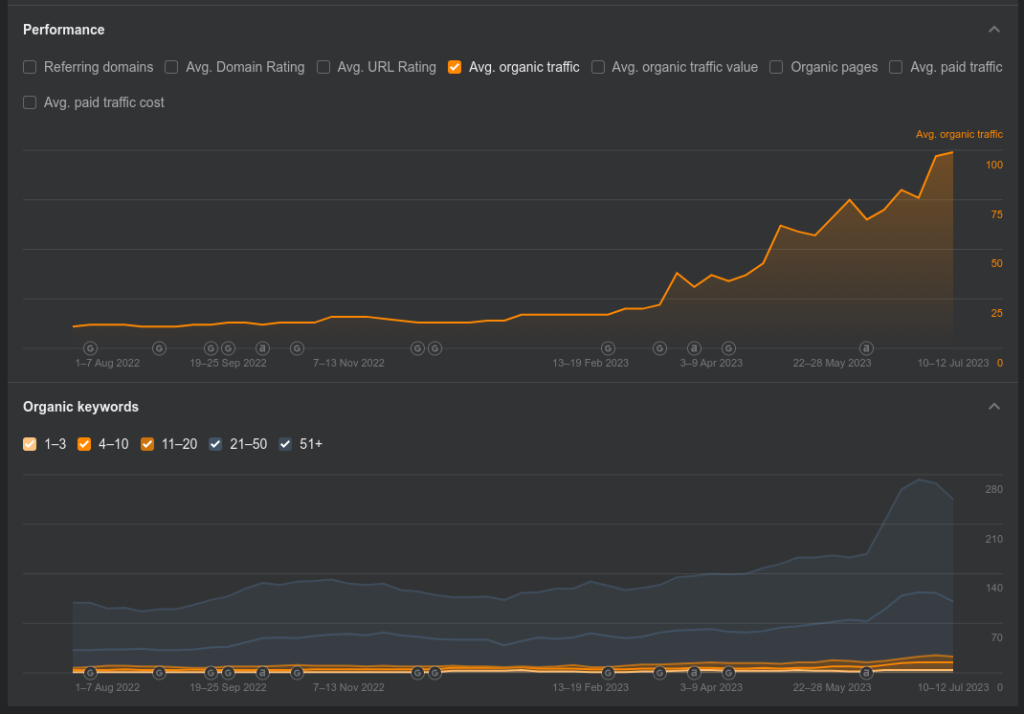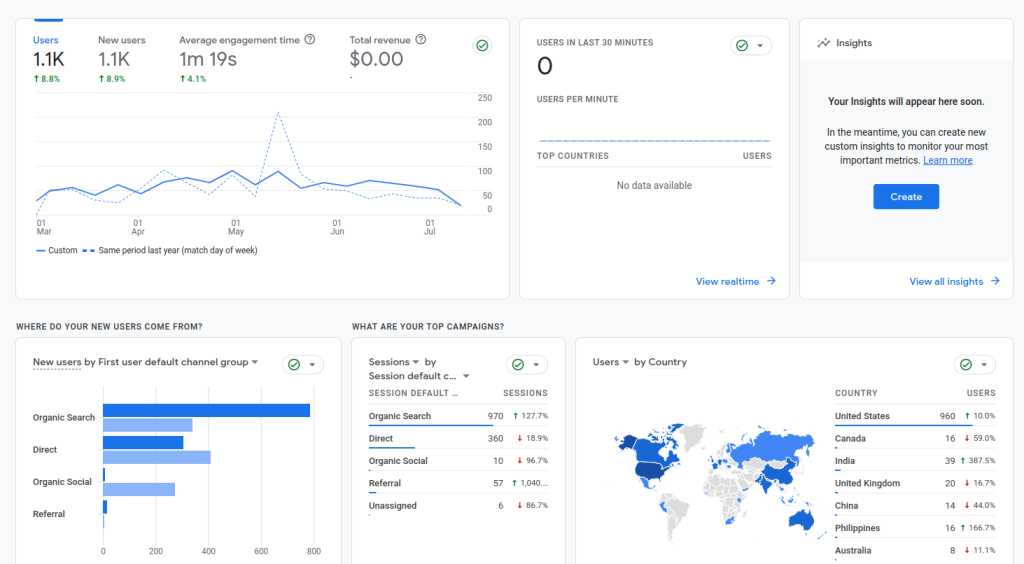How We Are Helping A Client In A Low Search Volume Market
This case study explores ongoing work with a client based in Florida, US. Our client works in a niche industry where there is little supporting data to help with SEO decisions. Read on to find out how we were able to rank our client higher in Google and get more phone calls for the business.
Arborist Expert Witness - A difficult low search volume industry
At the end of 2022, a gentleman approached me to enhance his website and get better page rankings to reach more of his client base – and these were attorneys. The website in question, Expert Tree Consultants (experttreeconsultants.com), serves a niche within a niche.
Joe Samnik is an experienced arborist with over 55 years in the industry and has spent much of his career as a forensic arborist and arborist expert witness. Someone like him is an injury, death, and contract legal cases expert.
Much like home services such as HVAC or plumbers, arborists and tree service companies need local SEO to help clients find them on Google. They also need a website where clients can learn about them. Performing local SEO optimizations is always nuanced, depending on the client. Still, it’s generally straightforward to rank a website that people are looking for in their geographic region or city.
Joe works in a niche within the arborist niche and works nationally throughout the US. The business is so specialized that it took a lot of work to discover what search terms attorney offices would use. Or if they were even searching on Google for such a niche expert.

How to find keywords in a niche industry
An SEO expert would usually use keyword tools such as SEMRush or ahrefs to find keywords to target, but these tools have so little data on odd cases like this that it’s hard to know where to start.
The first thing to do, however, was competitor analysis. I took a few hours to gather keyword data from similar websites in the industry. This and Joe’s own keyword data showed me keywords that could hold ranking potential.
After building a list of keywords, keyword difficulty, keyword monthly search volumes, and capturing cost per click for ads – which showed me what keywords were valuable to other businesses – I had a good starting point to explore.
One of the best ways to determine whether or not search terms give you the expected results and to understand the searcher’s intent is to put them into Google and see what that turns up. I would do this in an incognito window and ensure that my browser region settings reflect the area critical to Joe’s business. For example, I’m in Canada, and Joe is in the United States.
Keyword research in the wrong region can be disastrous for results.
Sure enough, we found several keywords with investigative intent that could prove pivotal for Joe’s website. Google served up transactional pages of legal directories and business websites that supplied expert witness or forensic arborist services.
Understanding a client's goals and setting expectations
Even before the keyword research takes place, it’s essential to understand the client’s goals and set expectations for the industry. In Joe’s case, it wasn’t the volume of traffic that was important. We wanted to target a specific visitor persona who would call his phone and engage his services. Joe was quick to point out that this wouldn’t be private citizens who had tree problems. Instead, it would be members of their legal team.
To this end, our investigative keywords became the primary focus. You always want to put your SEO effort into the bottom of the funnel keywords before you tackle other keywords. People who resonate with the bottom-of-the-funnel content are more likely to buy your product now or pick up the phone and call you regarding your services.
After organizing, qualifying, and prioritizing our keyword database, it was evident that we would focus on two landing pages designed to convert – before we moved on to informational content to generate awareness and drive authority.
However, before moving on to new content creation, I performed an SEO Audit and found opportunities to improve the website in several ways. Fixing an existing website to be more optimal is one of the quickest ways for Google to notice that activity is happening for the better – faster pages, better optimized pages, and pages without errors.
And a better website for Google means a better website for visitors and a solid foundation on which higher rankings can be achieved.
After I had completed the website fixes, we created a new page targeted at the keyword arborist expert witness and made that our first landing page. The second landing page would be our home page, optimized for forensic arborist.
When optimizing a home page, consider whether a separate and more specific page is more appropriate. We were already ranking for the keyword, albeit not highly, so it seemed natural to push this page up in the rankings. The key lesson here is that SEO is all about experimentation and doing that in a controlled manner based on experience.
Getting back-links and tracking results
We would track our home page target keyword over two or three months to see how it performs and then act on the data. If the data showed us that a new landing page would be better, we would move that way. However, within two months, we are ranking at number one locally, within Florida, and number three nationally. Our strategy seemed sound.
SEO experts often tell you it takes a lot of time and effort to rank number one. But this is only sometimes true. It depends on the keyword’s competitiveness, the industry, and your peers’ performance. In our case, we ranked number one quickly and maintain that rank today.
Our second and less mature landing page ranks well at number three locally and seven nationally. New rankings always bump up and down a bit but so far, so good. Over time, we will watch our rankings and work to get them higher. But knee-jerk reactions don’t help with this. Data takes time to accumulate, and the best decisions are made when enough data is available.
We’re now creating relevant informational content to support our landing pages and build authority and topical relevance. Informational pages such as “Who is responsible for fallen tree removal” and other subjects relevant to the legal and arborist fields will help bolster our position in Google.
I have also secured three high-profile editorial back-links to our landing pages. Links were placed on Lawyer Monthly, a Civil Engineering news website, and another legal website, Legal Desire.
Editorial back-links are high-value – not just web directories or low-value blogs.
These links are more about boosting website authority and trust, which helps with higher rankings, rather than getting more eyes on the website. But certainly, we do also have more eyes. It’s important to remember that editorial back-links only positively impact after several weeks or months of being acquired.
The end result
Search Engine Optimization is a long-term and high-value proposition that can really help boost business through website improvement and more connection to searchers through search engines.
In the case of Expert Tree Consultants, we’re starting to see more phone calls coming in. I requested that Joe always ask how the caller found us. And now they are starting to say just one word: Google.
Our work isn’t complete and we continue to work together to boost Joe’s website authority and rank his landing pages above everyone else’s. Continual improvement over time means big gains for Joe’s business.


Case study takeaways
- Keyword tools don’t have much data for low volume search niches.
- Use Google to research keywords, understand search intent and find bottom of the funnel (BoFu) keywords.
- Fix problems and optimize your website before creating new content.
- Target BoFu pages before creating informational content.
- Track keywords using a tool such as Nightwatch.io.
- SEO is about following the data, experimenting in a controlled and knowledgeable way, and pivoting over time for even better results.
- Sow the seeds and reap the rewards as time goes by. Compound positive change, just like investing.